Mental Health Care Disparities: Children and Young Adults Report
VerifiedAdded on 2023/01/07
|8
|2126
|34
Report
AI Summary
This report investigates the critical issue of racial and ethnic disparities in mental health care for children and young adults. It begins with an introduction that outlines the rationale, aims, objectives, and research questions guiding the study. The main body of the report includes a literature review exploring the concepts of racial and ethnic disparities, the factors contributing to these disparities, and the specific challenges faced by young people. The report also details the research methodology, which utilizes both qualitative and quantitative methods, along with primary and secondary data collection approaches. The discussion and analysis section examines the impact of disparities on mental health, while acknowledging the limitations of the research. The conclusion summarizes the key findings and emphasizes the need for interventions to reduce these disparities. The report draws on various sources to support its findings, providing a comprehensive overview of the issue and potential solutions.
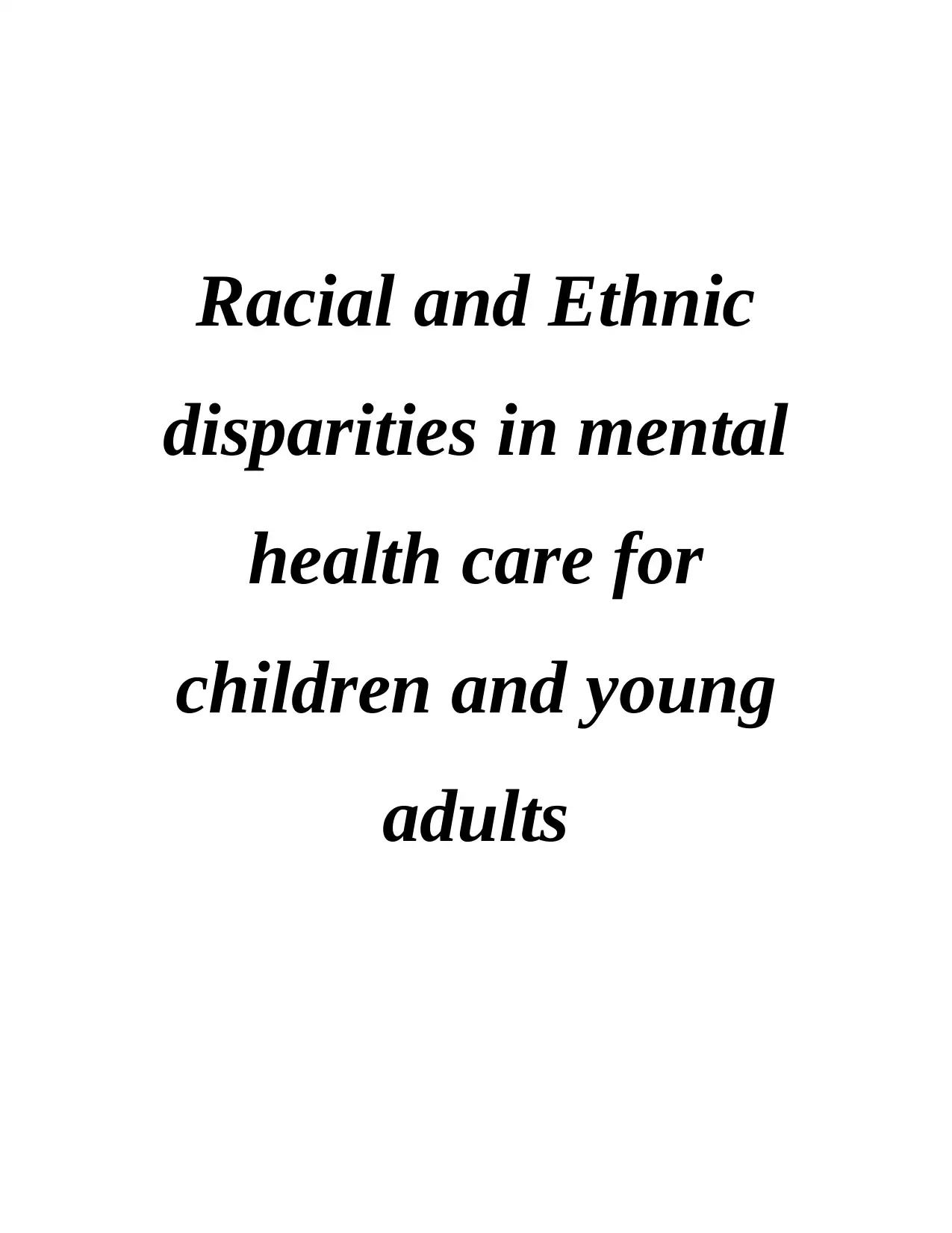
Racial and Ethnic
disparities in mental
health care for
children and young
adults
disparities in mental
health care for
children and young
adults
Paraphrase This Document
Need a fresh take? Get an instant paraphrase of this document with our AI Paraphraser
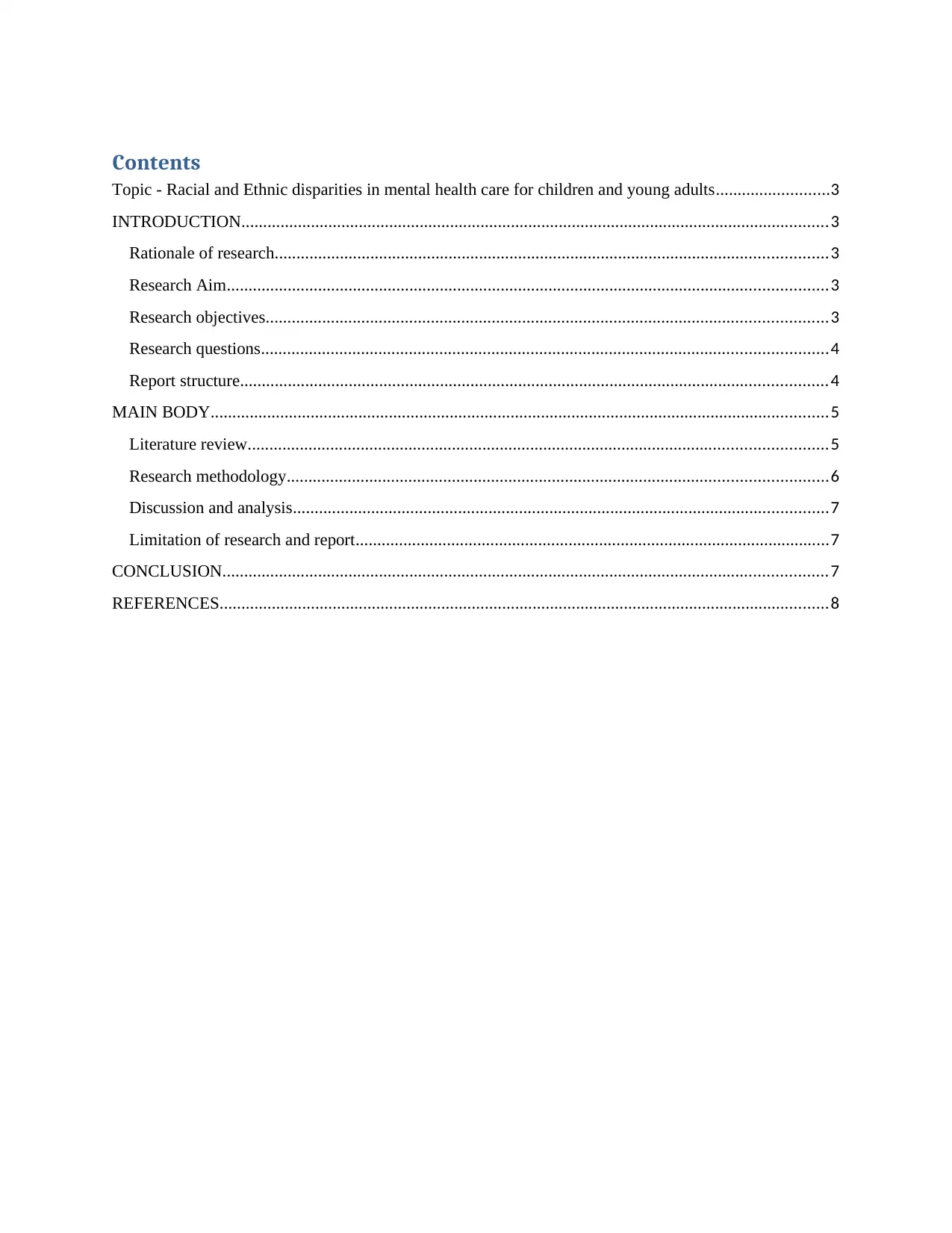
Contents
Topic - Racial and Ethnic disparities in mental health care for children and young adults..........................3
INTRODUCTION.......................................................................................................................................3
Rationale of research...............................................................................................................................3
Research Aim..........................................................................................................................................3
Research objectives.................................................................................................................................3
Research questions..................................................................................................................................4
Report structure.......................................................................................................................................4
MAIN BODY..............................................................................................................................................5
Literature review.....................................................................................................................................5
Research methodology............................................................................................................................6
Discussion and analysis...........................................................................................................................7
Limitation of research and report.............................................................................................................7
CONCLUSION...........................................................................................................................................7
REFERENCES............................................................................................................................................8
Topic - Racial and Ethnic disparities in mental health care for children and young adults..........................3
INTRODUCTION.......................................................................................................................................3
Rationale of research...............................................................................................................................3
Research Aim..........................................................................................................................................3
Research objectives.................................................................................................................................3
Research questions..................................................................................................................................4
Report structure.......................................................................................................................................4
MAIN BODY..............................................................................................................................................5
Literature review.....................................................................................................................................5
Research methodology............................................................................................................................6
Discussion and analysis...........................................................................................................................7
Limitation of research and report.............................................................................................................7
CONCLUSION...........................................................................................................................................7
REFERENCES............................................................................................................................................8
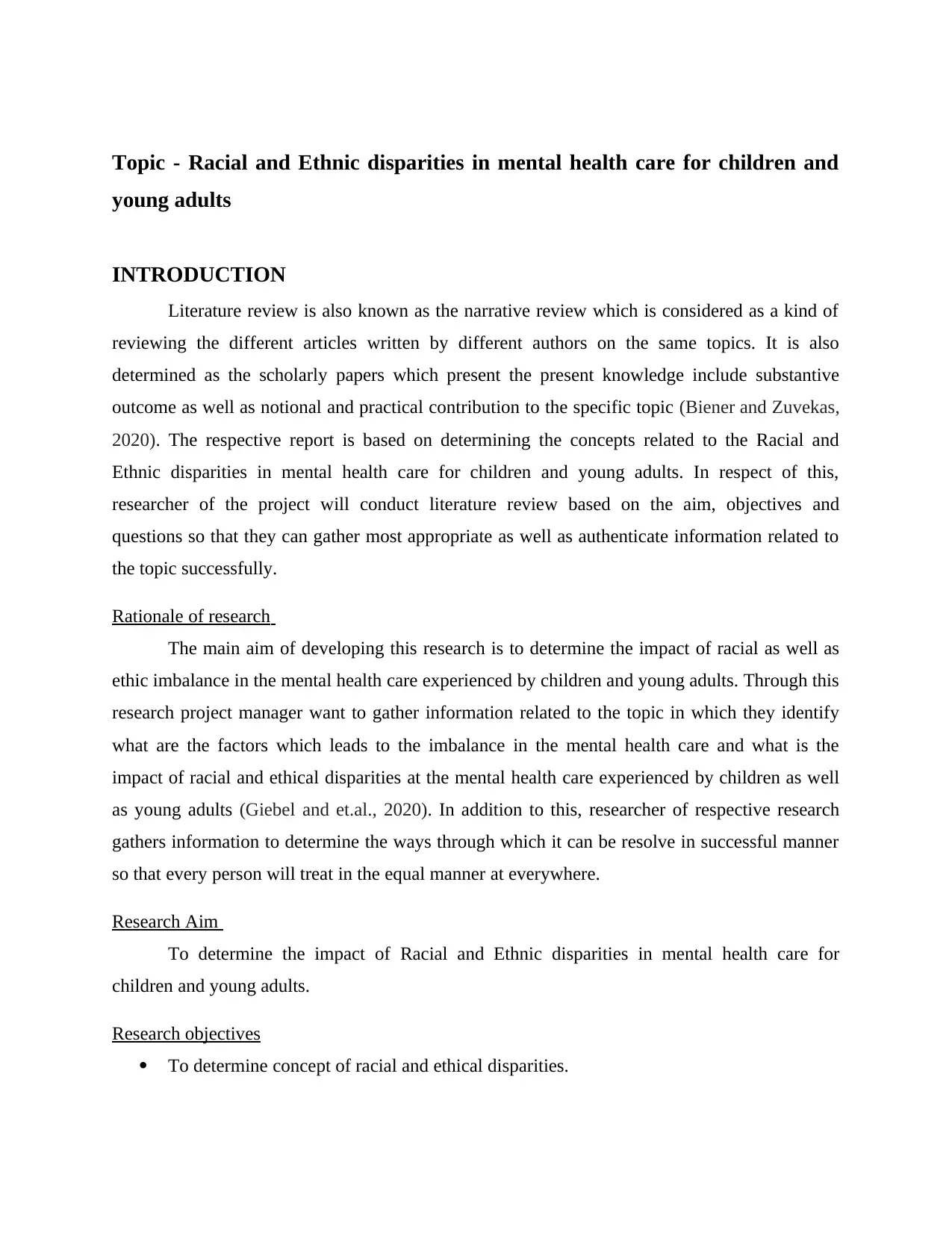
Topic - Racial and Ethnic disparities in mental health care for children and
young adults
INTRODUCTION
Literature review is also known as the narrative review which is considered as a kind of
reviewing the different articles written by different authors on the same topics. It is also
determined as the scholarly papers which present the present knowledge include substantive
outcome as well as notional and practical contribution to the specific topic (Biener and Zuvekas,
2020). The respective report is based on determining the concepts related to the Racial and
Ethnic disparities in mental health care for children and young adults. In respect of this,
researcher of the project will conduct literature review based on the aim, objectives and
questions so that they can gather most appropriate as well as authenticate information related to
the topic successfully.
Rationale of research
The main aim of developing this research is to determine the impact of racial as well as
ethic imbalance in the mental health care experienced by children and young adults. Through this
research project manager want to gather information related to the topic in which they identify
what are the factors which leads to the imbalance in the mental health care and what is the
impact of racial and ethical disparities at the mental health care experienced by children as well
as young adults (Giebel and et.al., 2020). In addition to this, researcher of respective research
gathers information to determine the ways through which it can be resolve in successful manner
so that every person will treat in the equal manner at everywhere.
Research Aim
To determine the impact of Racial and Ethnic disparities in mental health care for
children and young adults.
Research objectives
To determine concept of racial and ethical disparities.
young adults
INTRODUCTION
Literature review is also known as the narrative review which is considered as a kind of
reviewing the different articles written by different authors on the same topics. It is also
determined as the scholarly papers which present the present knowledge include substantive
outcome as well as notional and practical contribution to the specific topic (Biener and Zuvekas,
2020). The respective report is based on determining the concepts related to the Racial and
Ethnic disparities in mental health care for children and young adults. In respect of this,
researcher of the project will conduct literature review based on the aim, objectives and
questions so that they can gather most appropriate as well as authenticate information related to
the topic successfully.
Rationale of research
The main aim of developing this research is to determine the impact of racial as well as
ethic imbalance in the mental health care experienced by children and young adults. Through this
research project manager want to gather information related to the topic in which they identify
what are the factors which leads to the imbalance in the mental health care and what is the
impact of racial and ethical disparities at the mental health care experienced by children as well
as young adults (Giebel and et.al., 2020). In addition to this, researcher of respective research
gathers information to determine the ways through which it can be resolve in successful manner
so that every person will treat in the equal manner at everywhere.
Research Aim
To determine the impact of Racial and Ethnic disparities in mental health care for
children and young adults.
Research objectives
To determine concept of racial and ethical disparities.
⊘ This is a preview!⊘
Do you want full access?
Subscribe today to unlock all pages.

Trusted by 1+ million students worldwide
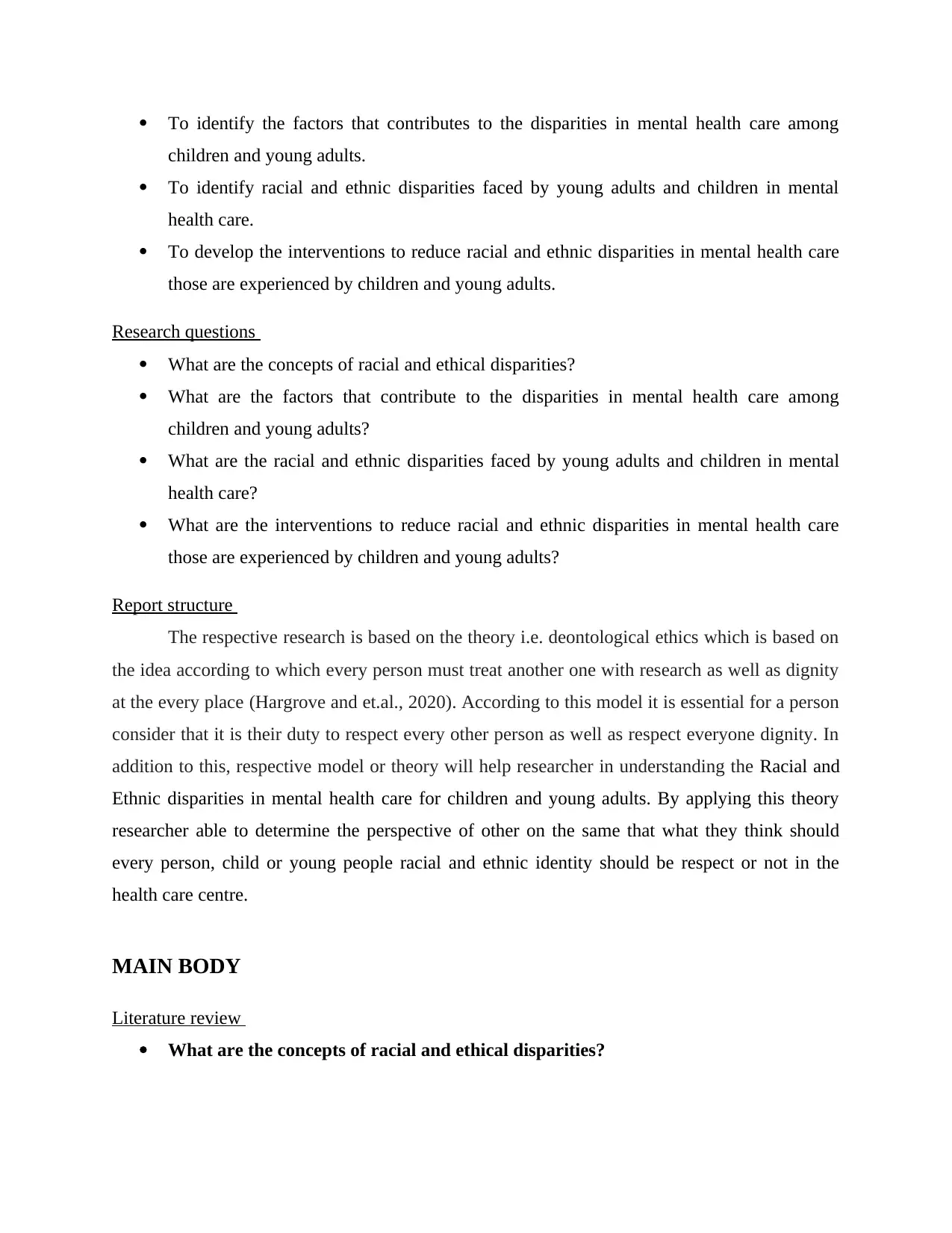
To identify the factors that contributes to the disparities in mental health care among
children and young adults.
To identify racial and ethnic disparities faced by young adults and children in mental
health care.
To develop the interventions to reduce racial and ethnic disparities in mental health care
those are experienced by children and young adults.
Research questions
What are the concepts of racial and ethical disparities?
What are the factors that contribute to the disparities in mental health care among
children and young adults?
What are the racial and ethnic disparities faced by young adults and children in mental
health care?
What are the interventions to reduce racial and ethnic disparities in mental health care
those are experienced by children and young adults?
Report structure
The respective research is based on the theory i.e. deontological ethics which is based on
the idea according to which every person must treat another one with research as well as dignity
at the every place (Hargrove and et.al., 2020). According to this model it is essential for a person
consider that it is their duty to respect every other person as well as respect everyone dignity. In
addition to this, respective model or theory will help researcher in understanding the Racial and
Ethnic disparities in mental health care for children and young adults. By applying this theory
researcher able to determine the perspective of other on the same that what they think should
every person, child or young people racial and ethnic identity should be respect or not in the
health care centre.
MAIN BODY
Literature review
What are the concepts of racial and ethical disparities?
children and young adults.
To identify racial and ethnic disparities faced by young adults and children in mental
health care.
To develop the interventions to reduce racial and ethnic disparities in mental health care
those are experienced by children and young adults.
Research questions
What are the concepts of racial and ethical disparities?
What are the factors that contribute to the disparities in mental health care among
children and young adults?
What are the racial and ethnic disparities faced by young adults and children in mental
health care?
What are the interventions to reduce racial and ethnic disparities in mental health care
those are experienced by children and young adults?
Report structure
The respective research is based on the theory i.e. deontological ethics which is based on
the idea according to which every person must treat another one with research as well as dignity
at the every place (Hargrove and et.al., 2020). According to this model it is essential for a person
consider that it is their duty to respect every other person as well as respect everyone dignity. In
addition to this, respective model or theory will help researcher in understanding the Racial and
Ethnic disparities in mental health care for children and young adults. By applying this theory
researcher able to determine the perspective of other on the same that what they think should
every person, child or young people racial and ethnic identity should be respect or not in the
health care centre.
MAIN BODY
Literature review
What are the concepts of racial and ethical disparities?
Paraphrase This Document
Need a fresh take? Get an instant paraphrase of this document with our AI Paraphraser
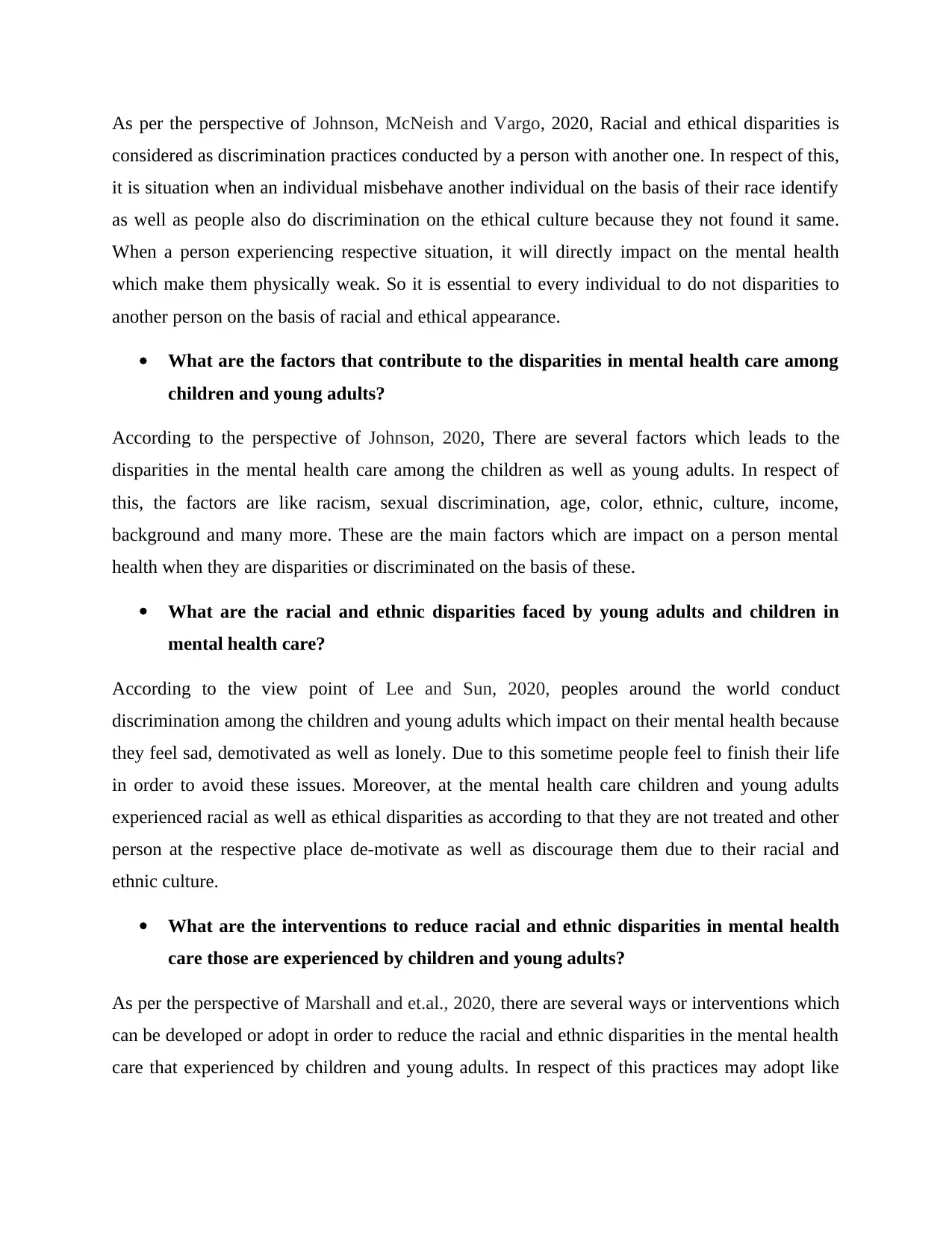
As per the perspective of Johnson, McNeish and Vargo, 2020, Racial and ethical disparities is
considered as discrimination practices conducted by a person with another one. In respect of this,
it is situation when an individual misbehave another individual on the basis of their race identify
as well as people also do discrimination on the ethical culture because they not found it same.
When a person experiencing respective situation, it will directly impact on the mental health
which make them physically weak. So it is essential to every individual to do not disparities to
another person on the basis of racial and ethical appearance.
What are the factors that contribute to the disparities in mental health care among
children and young adults?
According to the perspective of Johnson, 2020, There are several factors which leads to the
disparities in the mental health care among the children as well as young adults. In respect of
this, the factors are like racism, sexual discrimination, age, color, ethnic, culture, income,
background and many more. These are the main factors which are impact on a person mental
health when they are disparities or discriminated on the basis of these.
What are the racial and ethnic disparities faced by young adults and children in
mental health care?
According to the view point of Lee and Sun, 2020, peoples around the world conduct
discrimination among the children and young adults which impact on their mental health because
they feel sad, demotivated as well as lonely. Due to this sometime people feel to finish their life
in order to avoid these issues. Moreover, at the mental health care children and young adults
experienced racial as well as ethical disparities as according to that they are not treated and other
person at the respective place de-motivate as well as discourage them due to their racial and
ethnic culture.
What are the interventions to reduce racial and ethnic disparities in mental health
care those are experienced by children and young adults?
As per the perspective of Marshall and et.al., 2020, there are several ways or interventions which
can be developed or adopt in order to reduce the racial and ethnic disparities in the mental health
care that experienced by children and young adults. In respect of this practices may adopt like
considered as discrimination practices conducted by a person with another one. In respect of this,
it is situation when an individual misbehave another individual on the basis of their race identify
as well as people also do discrimination on the ethical culture because they not found it same.
When a person experiencing respective situation, it will directly impact on the mental health
which make them physically weak. So it is essential to every individual to do not disparities to
another person on the basis of racial and ethical appearance.
What are the factors that contribute to the disparities in mental health care among
children and young adults?
According to the perspective of Johnson, 2020, There are several factors which leads to the
disparities in the mental health care among the children as well as young adults. In respect of
this, the factors are like racism, sexual discrimination, age, color, ethnic, culture, income,
background and many more. These are the main factors which are impact on a person mental
health when they are disparities or discriminated on the basis of these.
What are the racial and ethnic disparities faced by young adults and children in
mental health care?
According to the view point of Lee and Sun, 2020, peoples around the world conduct
discrimination among the children and young adults which impact on their mental health because
they feel sad, demotivated as well as lonely. Due to this sometime people feel to finish their life
in order to avoid these issues. Moreover, at the mental health care children and young adults
experienced racial as well as ethical disparities as according to that they are not treated and other
person at the respective place de-motivate as well as discourage them due to their racial and
ethnic culture.
What are the interventions to reduce racial and ethnic disparities in mental health
care those are experienced by children and young adults?
As per the perspective of Marshall and et.al., 2020, there are several ways or interventions which
can be developed or adopt in order to reduce the racial and ethnic disparities in the mental health
care that experienced by children and young adults. In respect of this practices may adopt like
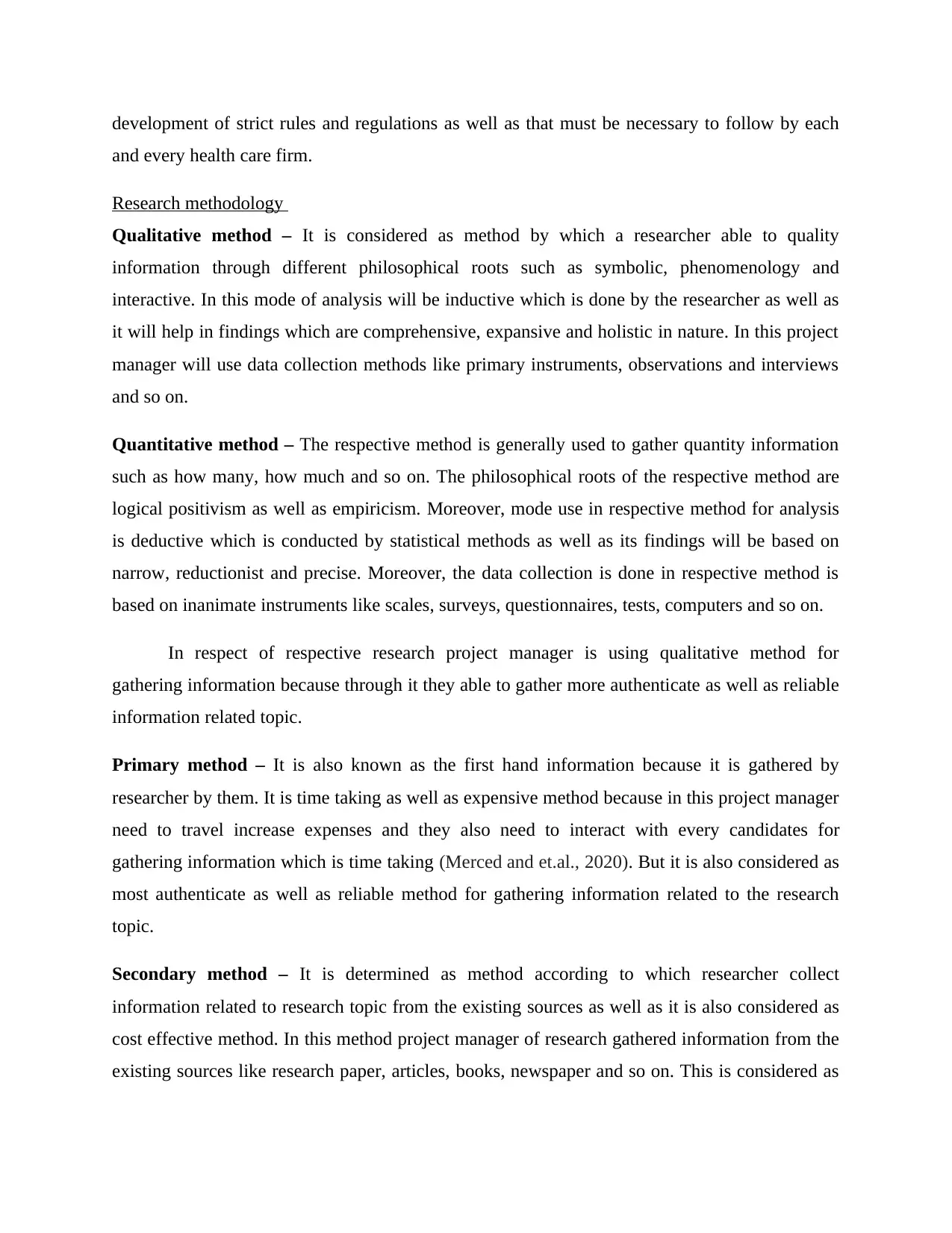
development of strict rules and regulations as well as that must be necessary to follow by each
and every health care firm.
Research methodology
Qualitative method – It is considered as method by which a researcher able to quality
information through different philosophical roots such as symbolic, phenomenology and
interactive. In this mode of analysis will be inductive which is done by the researcher as well as
it will help in findings which are comprehensive, expansive and holistic in nature. In this project
manager will use data collection methods like primary instruments, observations and interviews
and so on.
Quantitative method – The respective method is generally used to gather quantity information
such as how many, how much and so on. The philosophical roots of the respective method are
logical positivism as well as empiricism. Moreover, mode use in respective method for analysis
is deductive which is conducted by statistical methods as well as its findings will be based on
narrow, reductionist and precise. Moreover, the data collection is done in respective method is
based on inanimate instruments like scales, surveys, questionnaires, tests, computers and so on.
In respect of respective research project manager is using qualitative method for
gathering information because through it they able to gather more authenticate as well as reliable
information related topic.
Primary method – It is also known as the first hand information because it is gathered by
researcher by them. It is time taking as well as expensive method because in this project manager
need to travel increase expenses and they also need to interact with every candidates for
gathering information which is time taking (Merced and et.al., 2020). But it is also considered as
most authenticate as well as reliable method for gathering information related to the research
topic.
Secondary method – It is determined as method according to which researcher collect
information related to research topic from the existing sources as well as it is also considered as
cost effective method. In this method project manager of research gathered information from the
existing sources like research paper, articles, books, newspaper and so on. This is considered as
and every health care firm.
Research methodology
Qualitative method – It is considered as method by which a researcher able to quality
information through different philosophical roots such as symbolic, phenomenology and
interactive. In this mode of analysis will be inductive which is done by the researcher as well as
it will help in findings which are comprehensive, expansive and holistic in nature. In this project
manager will use data collection methods like primary instruments, observations and interviews
and so on.
Quantitative method – The respective method is generally used to gather quantity information
such as how many, how much and so on. The philosophical roots of the respective method are
logical positivism as well as empiricism. Moreover, mode use in respective method for analysis
is deductive which is conducted by statistical methods as well as its findings will be based on
narrow, reductionist and precise. Moreover, the data collection is done in respective method is
based on inanimate instruments like scales, surveys, questionnaires, tests, computers and so on.
In respect of respective research project manager is using qualitative method for
gathering information because through it they able to gather more authenticate as well as reliable
information related topic.
Primary method – It is also known as the first hand information because it is gathered by
researcher by them. It is time taking as well as expensive method because in this project manager
need to travel increase expenses and they also need to interact with every candidates for
gathering information which is time taking (Merced and et.al., 2020). But it is also considered as
most authenticate as well as reliable method for gathering information related to the research
topic.
Secondary method – It is determined as method according to which researcher collect
information related to research topic from the existing sources as well as it is also considered as
cost effective method. In this method project manager of research gathered information from the
existing sources like research paper, articles, books, newspaper and so on. This is considered as
⊘ This is a preview!⊘
Do you want full access?
Subscribe today to unlock all pages.

Trusted by 1+ million students worldwide
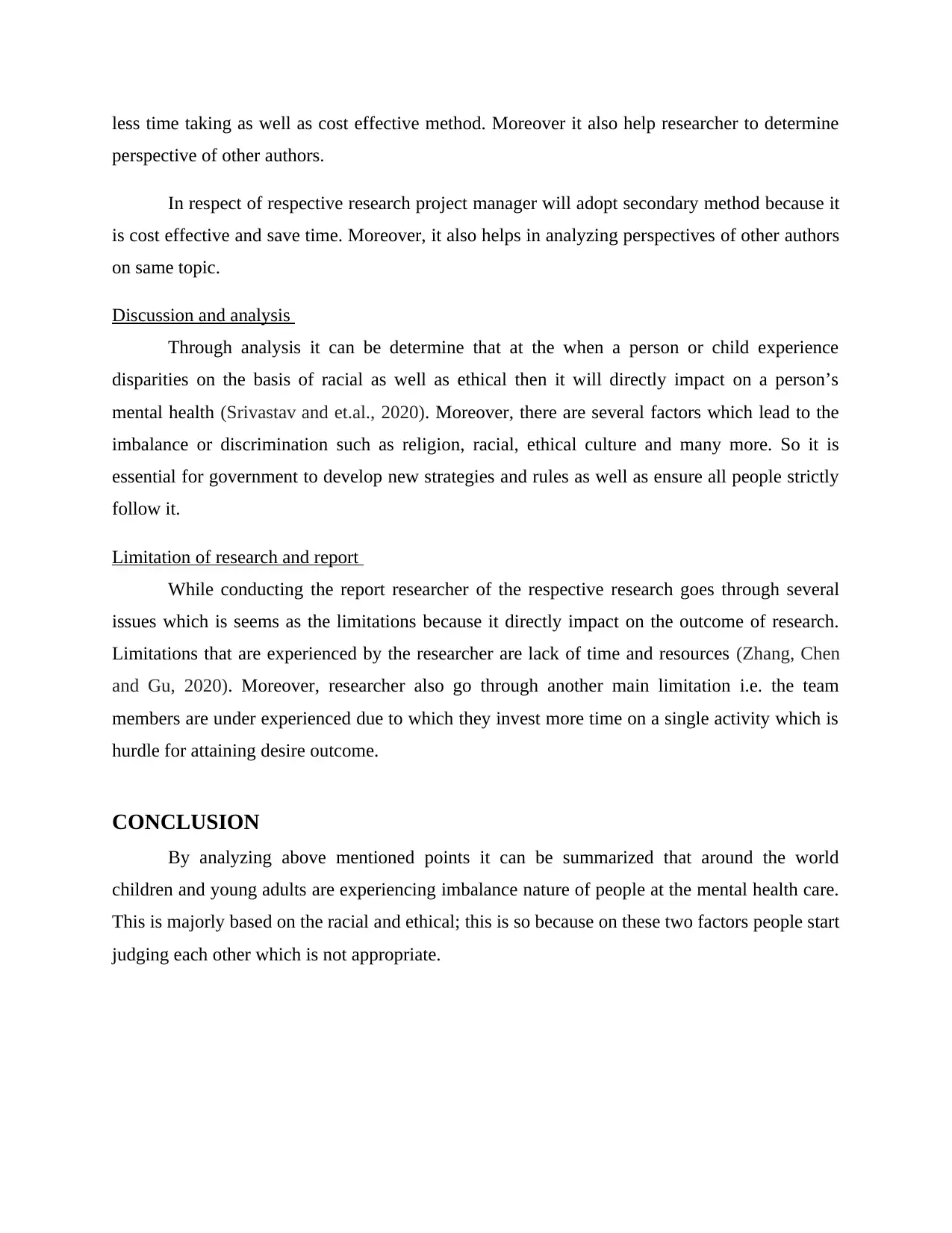
less time taking as well as cost effective method. Moreover it also help researcher to determine
perspective of other authors.
In respect of respective research project manager will adopt secondary method because it
is cost effective and save time. Moreover, it also helps in analyzing perspectives of other authors
on same topic.
Discussion and analysis
Through analysis it can be determine that at the when a person or child experience
disparities on the basis of racial as well as ethical then it will directly impact on a person’s
mental health (Srivastav and et.al., 2020). Moreover, there are several factors which lead to the
imbalance or discrimination such as religion, racial, ethical culture and many more. So it is
essential for government to develop new strategies and rules as well as ensure all people strictly
follow it.
Limitation of research and report
While conducting the report researcher of the respective research goes through several
issues which is seems as the limitations because it directly impact on the outcome of research.
Limitations that are experienced by the researcher are lack of time and resources (Zhang, Chen
and Gu, 2020). Moreover, researcher also go through another main limitation i.e. the team
members are under experienced due to which they invest more time on a single activity which is
hurdle for attaining desire outcome.
CONCLUSION
By analyzing above mentioned points it can be summarized that around the world
children and young adults are experiencing imbalance nature of people at the mental health care.
This is majorly based on the racial and ethical; this is so because on these two factors people start
judging each other which is not appropriate.
perspective of other authors.
In respect of respective research project manager will adopt secondary method because it
is cost effective and save time. Moreover, it also helps in analyzing perspectives of other authors
on same topic.
Discussion and analysis
Through analysis it can be determine that at the when a person or child experience
disparities on the basis of racial as well as ethical then it will directly impact on a person’s
mental health (Srivastav and et.al., 2020). Moreover, there are several factors which lead to the
imbalance or discrimination such as religion, racial, ethical culture and many more. So it is
essential for government to develop new strategies and rules as well as ensure all people strictly
follow it.
Limitation of research and report
While conducting the report researcher of the respective research goes through several
issues which is seems as the limitations because it directly impact on the outcome of research.
Limitations that are experienced by the researcher are lack of time and resources (Zhang, Chen
and Gu, 2020). Moreover, researcher also go through another main limitation i.e. the team
members are under experienced due to which they invest more time on a single activity which is
hurdle for attaining desire outcome.
CONCLUSION
By analyzing above mentioned points it can be summarized that around the world
children and young adults are experiencing imbalance nature of people at the mental health care.
This is majorly based on the racial and ethical; this is so because on these two factors people start
judging each other which is not appropriate.
Paraphrase This Document
Need a fresh take? Get an instant paraphrase of this document with our AI Paraphraser
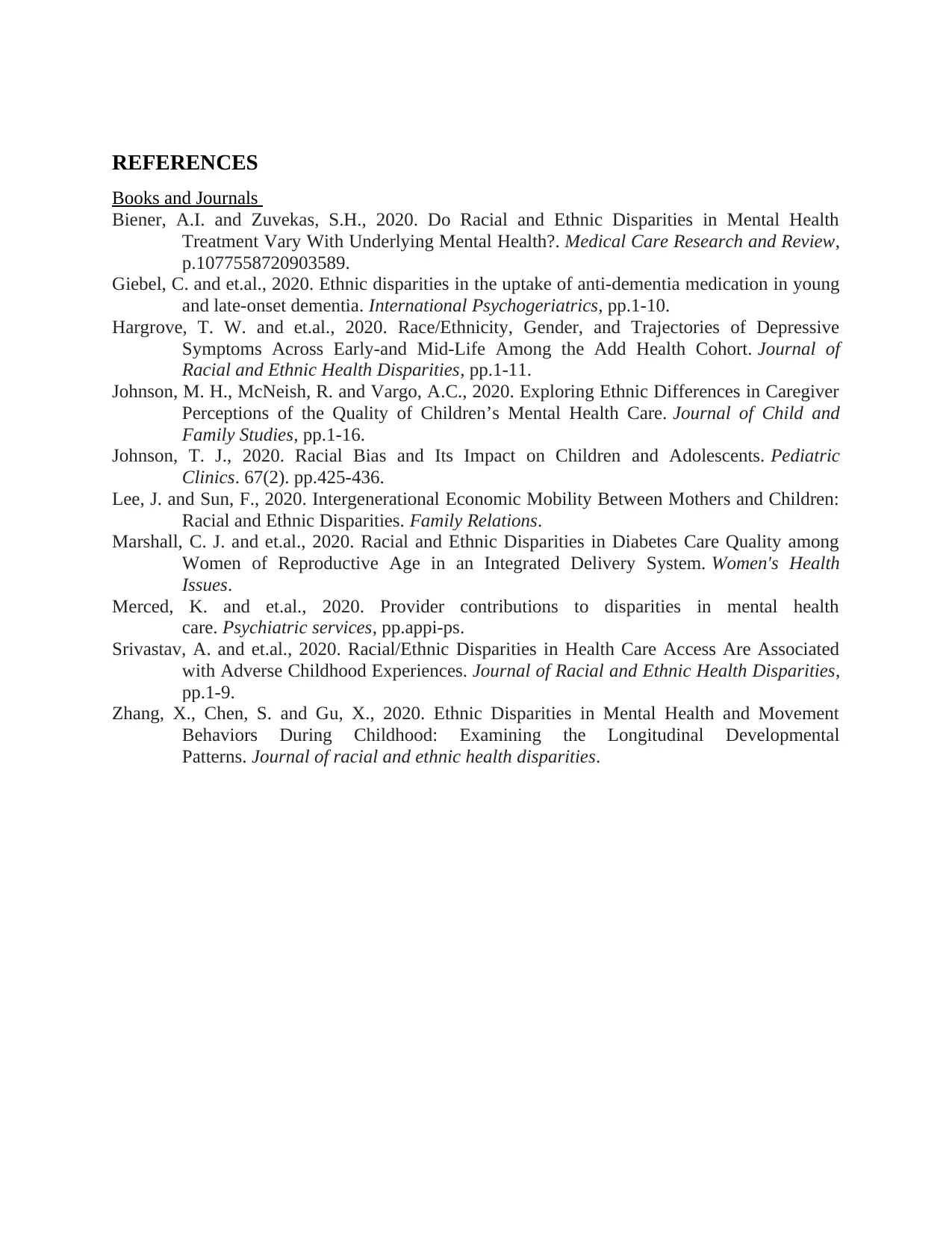
REFERENCES
Books and Journals
Biener, A.I. and Zuvekas, S.H., 2020. Do Racial and Ethnic Disparities in Mental Health
Treatment Vary With Underlying Mental Health?. Medical Care Research and Review,
p.1077558720903589.
Giebel, C. and et.al., 2020. Ethnic disparities in the uptake of anti-dementia medication in young
and late-onset dementia. International Psychogeriatrics, pp.1-10.
Hargrove, T. W. and et.al., 2020. Race/Ethnicity, Gender, and Trajectories of Depressive
Symptoms Across Early-and Mid-Life Among the Add Health Cohort. Journal of
Racial and Ethnic Health Disparities, pp.1-11.
Johnson, M. H., McNeish, R. and Vargo, A.C., 2020. Exploring Ethnic Differences in Caregiver
Perceptions of the Quality of Children’s Mental Health Care. Journal of Child and
Family Studies, pp.1-16.
Johnson, T. J., 2020. Racial Bias and Its Impact on Children and Adolescents. Pediatric
Clinics. 67(2). pp.425-436.
Lee, J. and Sun, F., 2020. Intergenerational Economic Mobility Between Mothers and Children:
Racial and Ethnic Disparities. Family Relations.
Marshall, C. J. and et.al., 2020. Racial and Ethnic Disparities in Diabetes Care Quality among
Women of Reproductive Age in an Integrated Delivery System. Women's Health
Issues.
Merced, K. and et.al., 2020. Provider contributions to disparities in mental health
care. Psychiatric services, pp.appi-ps.
Srivastav, A. and et.al., 2020. Racial/Ethnic Disparities in Health Care Access Are Associated
with Adverse Childhood Experiences. Journal of Racial and Ethnic Health Disparities,
pp.1-9.
Zhang, X., Chen, S. and Gu, X., 2020. Ethnic Disparities in Mental Health and Movement
Behaviors During Childhood: Examining the Longitudinal Developmental
Patterns. Journal of racial and ethnic health disparities.
Books and Journals
Biener, A.I. and Zuvekas, S.H., 2020. Do Racial and Ethnic Disparities in Mental Health
Treatment Vary With Underlying Mental Health?. Medical Care Research and Review,
p.1077558720903589.
Giebel, C. and et.al., 2020. Ethnic disparities in the uptake of anti-dementia medication in young
and late-onset dementia. International Psychogeriatrics, pp.1-10.
Hargrove, T. W. and et.al., 2020. Race/Ethnicity, Gender, and Trajectories of Depressive
Symptoms Across Early-and Mid-Life Among the Add Health Cohort. Journal of
Racial and Ethnic Health Disparities, pp.1-11.
Johnson, M. H., McNeish, R. and Vargo, A.C., 2020. Exploring Ethnic Differences in Caregiver
Perceptions of the Quality of Children’s Mental Health Care. Journal of Child and
Family Studies, pp.1-16.
Johnson, T. J., 2020. Racial Bias and Its Impact on Children and Adolescents. Pediatric
Clinics. 67(2). pp.425-436.
Lee, J. and Sun, F., 2020. Intergenerational Economic Mobility Between Mothers and Children:
Racial and Ethnic Disparities. Family Relations.
Marshall, C. J. and et.al., 2020. Racial and Ethnic Disparities in Diabetes Care Quality among
Women of Reproductive Age in an Integrated Delivery System. Women's Health
Issues.
Merced, K. and et.al., 2020. Provider contributions to disparities in mental health
care. Psychiatric services, pp.appi-ps.
Srivastav, A. and et.al., 2020. Racial/Ethnic Disparities in Health Care Access Are Associated
with Adverse Childhood Experiences. Journal of Racial and Ethnic Health Disparities,
pp.1-9.
Zhang, X., Chen, S. and Gu, X., 2020. Ethnic Disparities in Mental Health and Movement
Behaviors During Childhood: Examining the Longitudinal Developmental
Patterns. Journal of racial and ethnic health disparities.
1 out of 8
Related Documents
Your All-in-One AI-Powered Toolkit for Academic Success.
+13062052269
info@desklib.com
Available 24*7 on WhatsApp / Email
![[object Object]](/_next/static/media/star-bottom.7253800d.svg)
Unlock your academic potential
Copyright © 2020–2025 A2Z Services. All Rights Reserved. Developed and managed by ZUCOL.





